【广东学导练】2015-2016学年英语牛津深圳版七年级下册课件Unit 7 Poems(共28张PPT)
文档属性
| 名称 | 【广东学导练】2015-2016学年英语牛津深圳版七年级下册课件Unit 7 Poems(共28张PPT) | 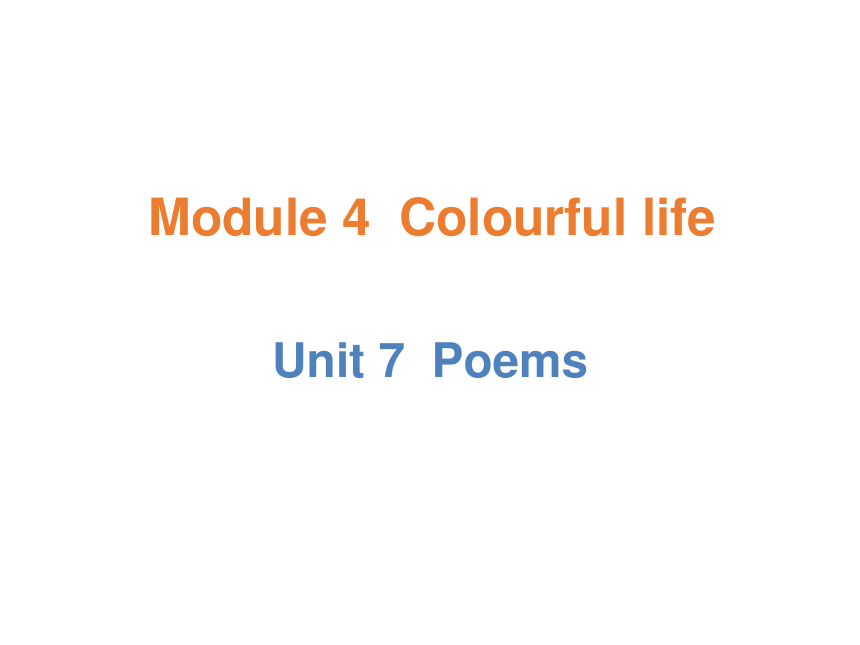 | |
| 格式 | zip | ||
| 文件大小 | 73.0KB | ||
| 资源类型 | 教案 | ||
| 版本资源 | 牛津深圳版 | ||
| 科目 | 英语 | ||
| 更新时间 | 2016-07-05 22:09:39 | ||
图片预览

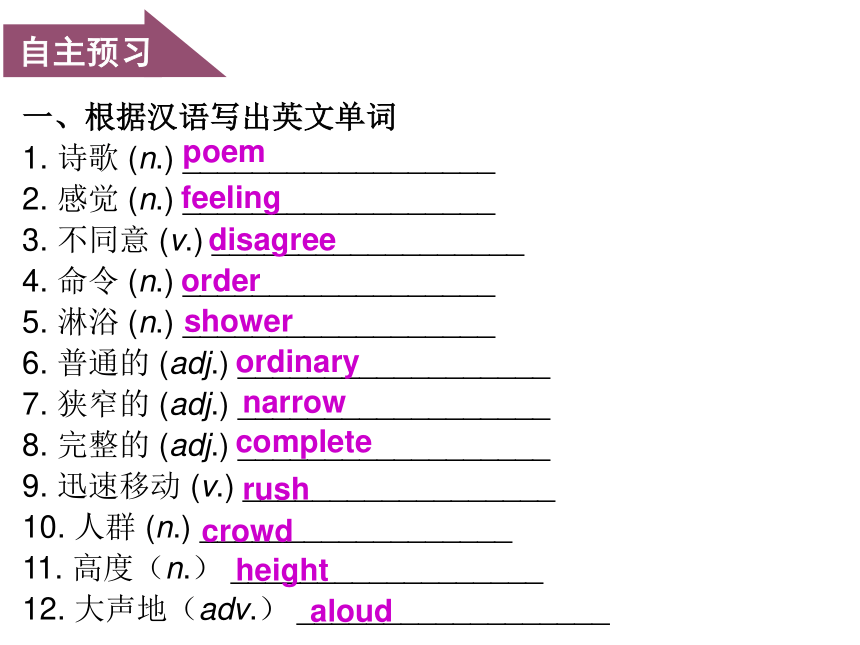
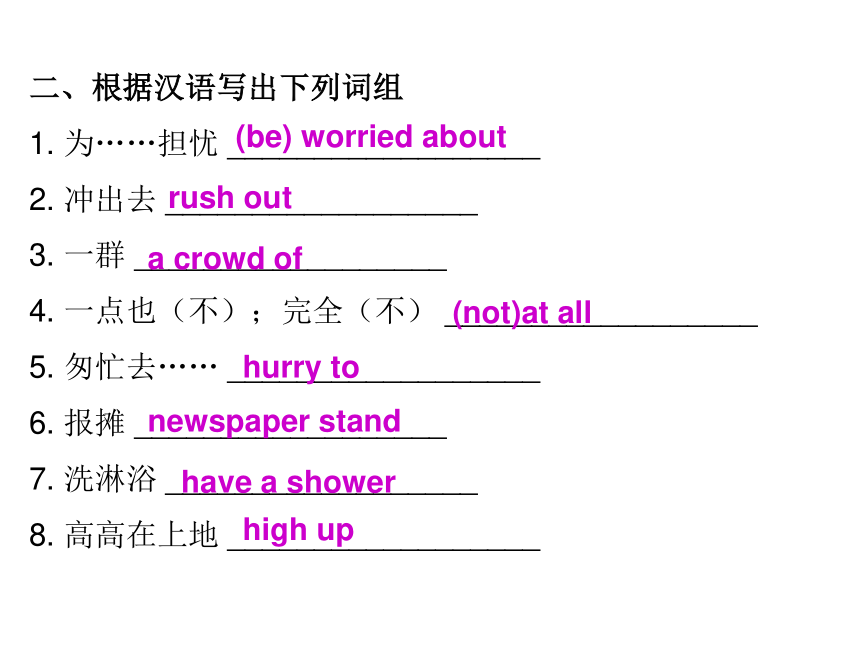
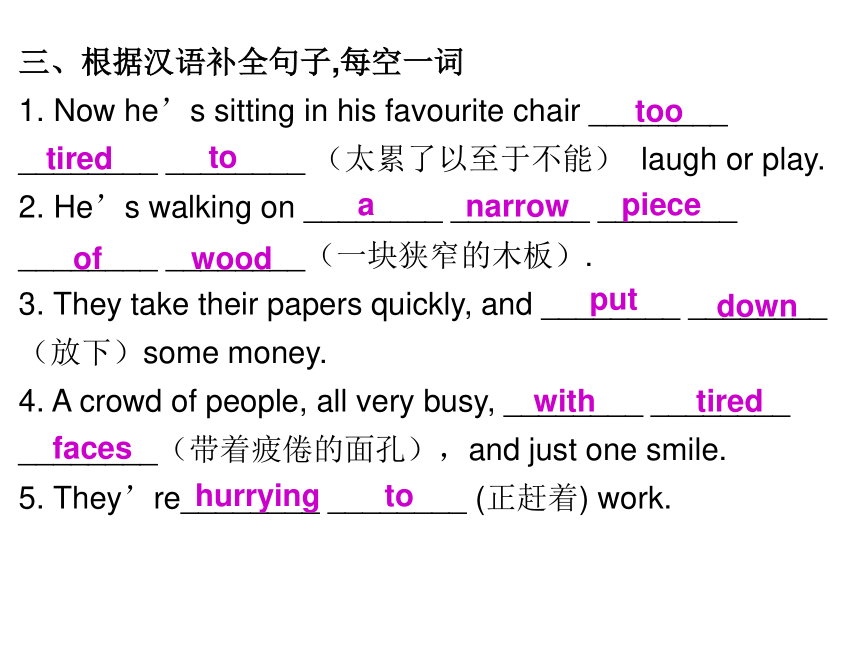
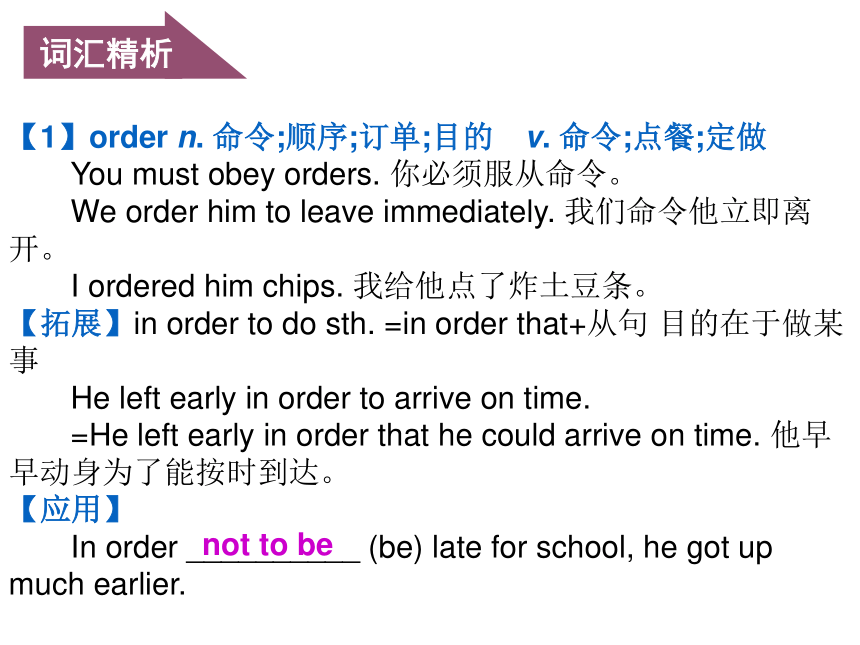
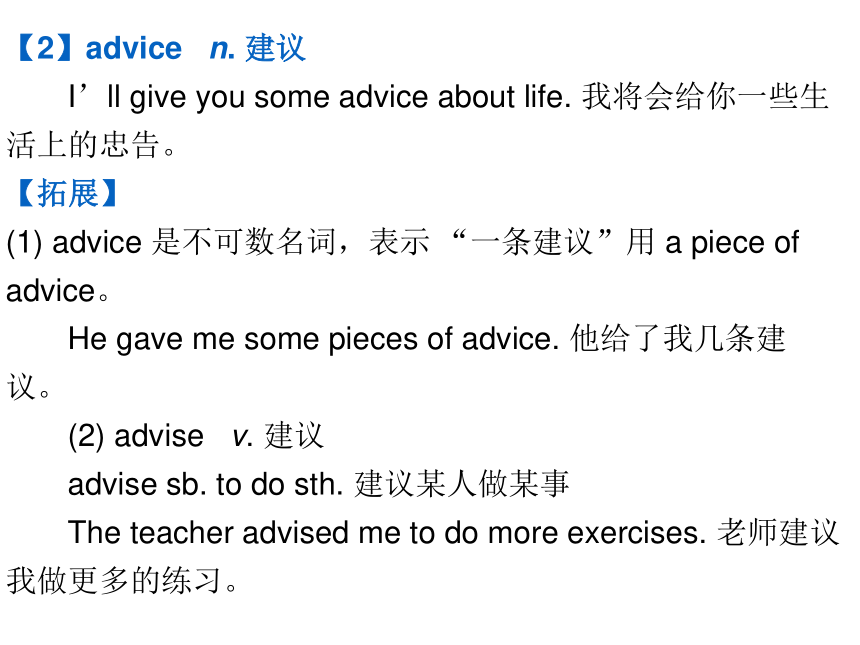
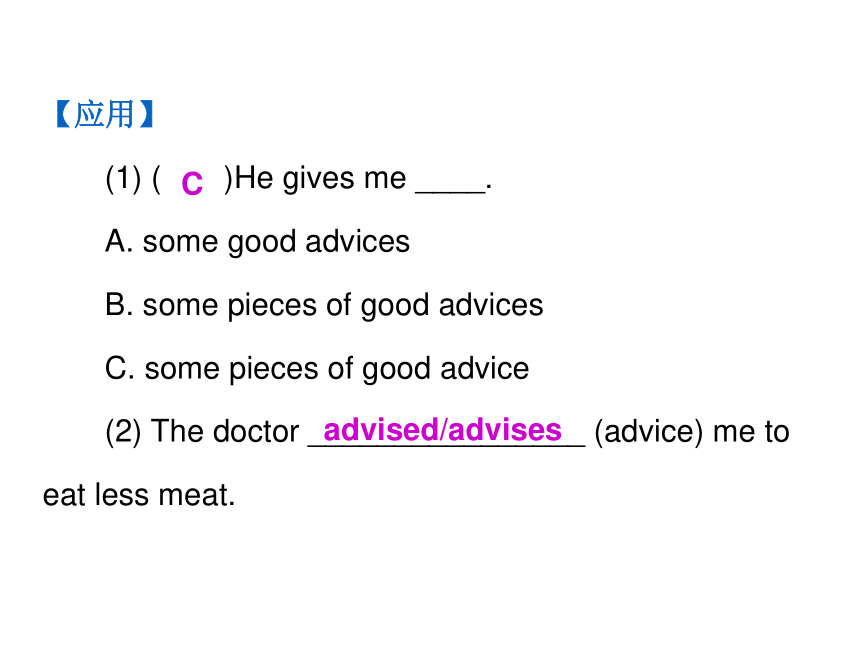
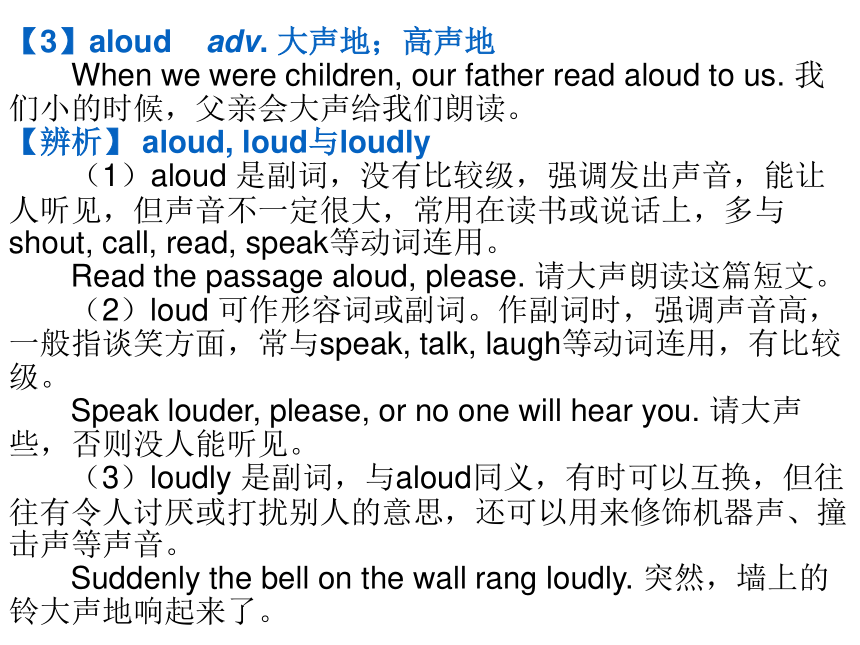
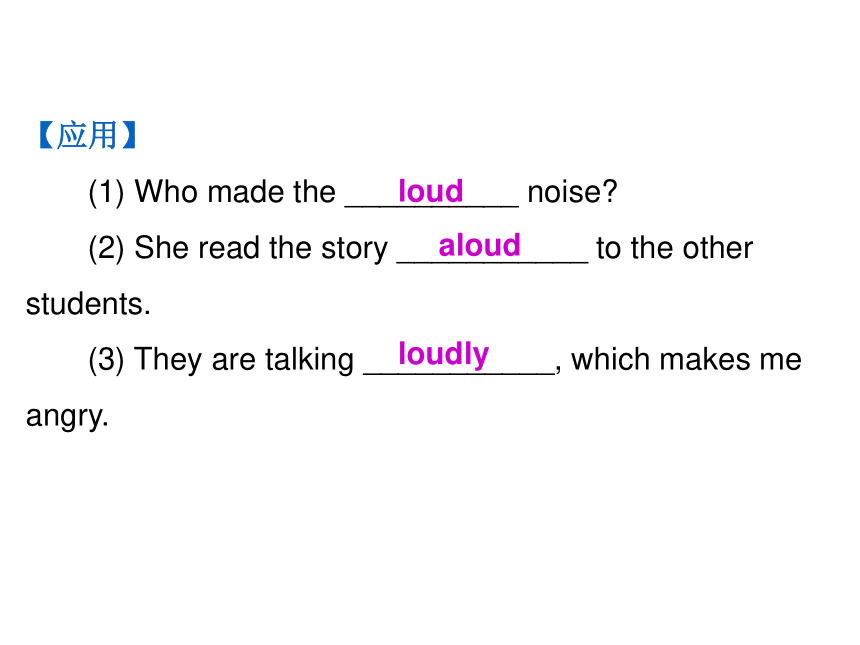
文档简介
课件28张PPT。Unit 7 PoemsModule 4 Colourful life自主预习一、根据汉语写出英文单词
1. 诗歌 (n.) __________________
2. 感觉 (n.) __________________
3. 不同意 (v.) __________________
4. 命令 (n.) __________________
5. 淋浴 (n.) __________________
6. 普通的 (adj.) __________________
7. 狭窄的 (adj.) __________________
8. 完整的 (adj.) __________________
9. 迅速移动 (v.) __________________
10. 人群 (n.) __________________
11. 高度(n.) __________________
12. 大声地(adv.) __________________poemfeelingdisagreeordershowerordinarynarrowcompleterushcrowdheightaloud二、根据汉语写出下列词组
1. 为……担忧 __________________
2. 冲出去 __________________
3. 一群 __________________
4. 一点也(不);完全(不) __________________
5. 匆忙去…… __________________
6. 报摊 __________________
7. 洗淋浴 __________________
8. 高高在上地 __________________(be) worried aboutrush outa crowd of(not)at allhurry tonewspaper standhave a showerhigh up三、根据汉语补全句子,每空一词
1. Now he’s sitting in his favourite chair ________ ________ ________ (太累了以至于不能) laugh or play.
2. He’s walking on ________ ________ ________ ________ ________(一块狭窄的木板).
3. They take their papers quickly, and ________ ________(放下)some money.
4. A crowd of people, all very busy, ________ ________ ________(带着疲倦的面孔),and just one smile.
5. They’re________ ________ (正赶着) work. tootired toanarrowpieceofwood putdownwithtiredfaceshurryingto词汇精析【1】order n. 命令;顺序;订单;目的 v. 命令;点餐;定做
You must obey orders. 你必须服从命令。
We order him to leave immediately. 我们命令他立即离
开。
I ordered him chips. 我给他点了炸土豆条。
【拓展】in order to do sth. =in order that+从句 目的在于做某事
He left early in order to arrive on time.
=He left early in order that he could arrive on time. 他早早动身为了能按时到达。
【应用】
In order __________ (be) late for school, he got up much earlier. not to be【2】advice n. 建议
I’ll give you some advice about life. 我将会给你一些生活上的忠告。
【拓展】
(1) advice 是不可数名词,表示 “一条建议”用 a piece of advice。
He gave me some pieces of advice. 他给了我几条建
议。
(2) advise v. 建议
advise sb. to do sth. 建议某人做某事
The teacher advised me to do more exercises. 老师建议我做更多的练习。【应用】
(1) ( )He gives me ____.
A. some good advices
B. some pieces of good advices
C. some pieces of good advice
(2) The doctor ________________ (advice) me to eat less meat. Cadvised/advises【3】aloud adv. 大声地;高声地
When we were children, our father read aloud to us. 我们小的时候,父亲会大声给我们朗读。
【辨析】 aloud, loud与loudly
(1)aloud 是副词,没有比较级,强调发出声音,能让人听见,但声音不一定很大,常用在读书或说话上,多与shout, call, read, speak等动词连用。
Read the passage aloud, please. 请大声朗读这篇短文。
(2)loud 可作形容词或副词。作副词时,强调声音高,一般指谈笑方面,常与speak, talk, laugh等动词连用,有比较级。
Speak louder, please, or no one will hear you. 请大声
些,否则没人能听见。
(3)loudly 是副词,与aloud同义,有时可以互换,但往往有令人讨厌或打扰别人的意思,还可以用来修饰机器声、撞击声等声音。
Suddenly the bell on the wall rang loudly. 突然,墙上的铃大声地响起来了。【应用】
(1) Who made the __________ noise?
(2) She read the story ___________ to the other students.
(3) They are talking ___________, which makes me angry. loudaloudloudly 【4】agree v. 同意
If you don’t agree, neither shall I. 如果你不同意,我也不同意。
【拓展】
(1) agree with sb. 同意某人的意见
I agree with you. 我同意你的意见。
(2) agree on 对……取得一致意见
We agreed on a price for the house. 我们商定了房子的价格。
(3) agree to 同意;接受
Do you agree to my suggestion? 您接受我的意见吗?
(4) agreement n. 协议;同意;一致
Reaching agreement won’t be easy. 要达成一致并不容易。
(5) disagree v. 不同意
I disagree with you. 我不同意你的意见。【应用】
(1) His opinion is in __________ (agree) with mine.
(2) Though what you said is right in a way, I ________ (agree) with you.
(3) ( )Neither father nor mother would agree _____ your plan.
A. with B. to C. on agreementdisagreeB【5】height n. 高度
The tree grew to a height of 20 feet. 那棵树长到二十英尺高。
【拓展】
high/tall adj. 高的——height n. 高度
long adj. 长的 —— length n. 长度
wide adj. 宽的 —— width n. 宽度
weigh v. 称重—— weight n. 重量
【应用】
(1) What is the _________ (high) of the tower?
(2) What’s your height? (改为同义句)
________ ________ ________ ________?heightHowtallareyou【6】crowd n. 人群
A huge crowd gathered in a square. 一大群人聚集在广场上。
【拓展】
(1) a crowd of 一群
The star was surrounded by a crowd of fans. 明星被一群粉丝包围着。
(2) be crowded with 充满;满是
The old town square was crowded with people. 古老的小镇广场上挤满了人。
(3) crowded adj. 水泄不通的;拥挤的
He looked around at the crowded beach. 他环视了一下拥挤的沙滩。
【应用】
The street is ___________ (crowd) and noisy. crowded【7】be worried about 为……担忧
Don’t be worried about me; I can take good care of myself. 不要担心我,我会照顾好自己的。
【拓展】
(1)worry可作及物动词,意为“使烦恼;使焦虑”,常接sb.作宾语。
What worried you so much? 什么事使你这么着急?
(2)worry也可作不及物动词,意为“烦恼;担心;发愁”,常跟介词about。
They are worrying about the coming exam.他们正在为即将到来的考试而发愁。
【应用】
( )He is worried ____ her safety.
A. about B. with C. ofA【8】seller n. 卖方;卖家; 售出之物
He works as a bookseller. 他是一名书商。
This dictionary is a best seller. 这本词典是畅销书。
【拓展】
(1)sell (sold, sold) v. 卖;销售
We persuaded her to sell the house. 我们劝她卖掉房子。
(2)sell out 卖光
The tickets have been sold out. 票已售完。
【应用】
We want to write a story about an excellent _________
(sell). seller【9】complete adj. 完整的;整个的
Can you tell me the complete story? 你能告诉我整个故事吗?
【拓展】
(1)complete v. 完成;使结束;填(表格)
Complete your application in ink. 用钢笔填写申请表。
(2)completely adv. 完整地;彻底地
I trust him completely. 我完全信任他。
【应用】
We must do the work ________________(complete).completely【10】well n. 井;水井
There is an old well in the east of the village. 在村东头儿有一口老井。
【拓展】
(1)well adj. 身体健康的
Is she well enough to travel? 她身体康复,能够旅行了吗?
(2)well adv. good 的副词形式,好地。
She speaks English very well. 她英语讲得很好。
【应用】
Linda does ___________ (good) in English. well语法梳理语法精讲祈使句
1. 祈使句表示请求、命令、建议、劝告和号召等含义,其肯定形式是以动词原形开头,否定形式是在动词原形之前加 don’t。
Please give me another chance. I will do it better. 请再给我一次机会吧。我会做得更好的。(表请求)
Don’t play with fire. 不要玩火。(表命令)
Don’t be nervous when you have an interview. 你在面试时不要紧张。(表建议) 2. 以let开头的祈使句,后面加宾语和动词原形;否定形式是在动词前面加not。
Let’s protect our Earth together. 让我们一起保护地球吧!
Let us not talk of that matter. 不要谈这件事。
3. 回答祈使句的时候,通常用will/won’t。
—Don’t forget to turn off the lights before you leave the lab. 离开实验室前别忘关灯。
—No, I won’t. 是的,我不会忘记的。 4. 祈使句的反意疑问句通常用will you/won’t you, 但当陈述部分为否定式时,则疑问部分只用will you。
Lend me your pen, will you? 把你的钢笔借给我,好吗?
Don’t open your books, will you?请不要打开书,好吗?
5. let’s开头的祈使句,反意疑问句常用shall we或shan’t we。let us/me/him开头的祈使句,反意疑问句则要用will you或won’t you。
Let’s play together, shall we? 我们一起玩,好吗?
Let me have a try, will you? 让我试一试,好吗?感叹句
感叹句一般是用来表示说话时的喜悦、惊讶等情感。英语中的感叹句常用 “what”和 “how”引导。
1. 由 “what”引导的感叹句: what意为 “多么”, 用作定语,修饰名词。单数可数名词前要加不定冠词a/an,
复数可数名词或不可数名词前不用冠词。这类感叹句的结构是:
(1) What+a/an+形容词+单数名词+主语+谓语!
What a clever girl she is! 她是一个多么聪明的姑娘呀!
(2)What+形容词+复数名词/不可数名词+主语+谓语!
What good children they are! 他们是多么好的孩子呀!
What delicious food it is! 多么美味的食物呀! 2. 由 “how”引导的感叹句: how意为 “多么”,用作状语,修饰形容词或副词。如果修饰形容词,则句中的谓语动词用系动词;如果修饰副词,则句中的谓语动词用行为动词。这类感叹句的结构是:
(1) How+形容词+主语+谓语!
How nice the pictures are! 多么漂亮的图画呀!
(2) How+副词+主语+谓语!
How well she dances! 她跳舞跳得多好呀!
(3) How+主语+谓语!
How time flies! 时间过得真快啊! 3. what引导的感叹句与how引导的感叹句的转换。
What a hot day it is!=How hot the day is! 多么热的天气呀!
What tall buildings they are!=How tall the buildings are! 多么高的楼房呀!
What bright sunshine it is!=How bright the sunshine is! 多么明亮的阳光呀!
4. 感叹句在表示激动、强烈的感情时,口语中常常把后面的主语和谓语省略。
What red apples! 多么红的苹果呀!
How wonderful! 精彩极了!直击中考( )1. —____ sweet music!
—And I really like the Voice of China TV
programmes. (2014咸宁)
A.What B.What a C.How D.How a
( )2. —____ brave Zhang Hua is!
—Yes. He helped his neighbour, Mrs Sun out of
the fire.(2014南京)
A. What a B. How C. How a D. What
( )3. ____ weather it is today! (2014十堰)
A. What hot B. How hot
C. What a hot D. How a hotABA写作乐园话题七 以诗歌的形式介绍一个人
【精彩句型】
1. What a great woman she is! 她是一位多么伟大的女性啊!
2. How brave he is! 他多么勇敢啊!【短文写作】
请你完成下面这首诗歌,描述一下你要见的人的名字和他/她的职业,并对他/她做出评价。
You are going to meet _____________.
(She/He) is a _______________.
_________________________ (what does he/she do?)
__________________________.
How __________ (he/she) is!
What a _________ (woman/man; she/he) is!【范文赏析】
You are going to meet Aunt Liana.
She is a street cleaner.
She cleans up things that people drops.
From spring to winter she never stops.
How ordinary she is!
What a great woman she is!谢谢欣赏!
1. 诗歌 (n.) __________________
2. 感觉 (n.) __________________
3. 不同意 (v.) __________________
4. 命令 (n.) __________________
5. 淋浴 (n.) __________________
6. 普通的 (adj.) __________________
7. 狭窄的 (adj.) __________________
8. 完整的 (adj.) __________________
9. 迅速移动 (v.) __________________
10. 人群 (n.) __________________
11. 高度(n.) __________________
12. 大声地(adv.) __________________poemfeelingdisagreeordershowerordinarynarrowcompleterushcrowdheightaloud二、根据汉语写出下列词组
1. 为……担忧 __________________
2. 冲出去 __________________
3. 一群 __________________
4. 一点也(不);完全(不) __________________
5. 匆忙去…… __________________
6. 报摊 __________________
7. 洗淋浴 __________________
8. 高高在上地 __________________(be) worried aboutrush outa crowd of(not)at allhurry tonewspaper standhave a showerhigh up三、根据汉语补全句子,每空一词
1. Now he’s sitting in his favourite chair ________ ________ ________ (太累了以至于不能) laugh or play.
2. He’s walking on ________ ________ ________ ________ ________(一块狭窄的木板).
3. They take their papers quickly, and ________ ________(放下)some money.
4. A crowd of people, all very busy, ________ ________ ________(带着疲倦的面孔),and just one smile.
5. They’re________ ________ (正赶着) work. tootired toanarrowpieceofwood putdownwithtiredfaceshurryingto词汇精析【1】order n. 命令;顺序;订单;目的 v. 命令;点餐;定做
You must obey orders. 你必须服从命令。
We order him to leave immediately. 我们命令他立即离
开。
I ordered him chips. 我给他点了炸土豆条。
【拓展】in order to do sth. =in order that+从句 目的在于做某事
He left early in order to arrive on time.
=He left early in order that he could arrive on time. 他早早动身为了能按时到达。
【应用】
In order __________ (be) late for school, he got up much earlier. not to be【2】advice n. 建议
I’ll give you some advice about life. 我将会给你一些生活上的忠告。
【拓展】
(1) advice 是不可数名词,表示 “一条建议”用 a piece of advice。
He gave me some pieces of advice. 他给了我几条建
议。
(2) advise v. 建议
advise sb. to do sth. 建议某人做某事
The teacher advised me to do more exercises. 老师建议我做更多的练习。【应用】
(1) ( )He gives me ____.
A. some good advices
B. some pieces of good advices
C. some pieces of good advice
(2) The doctor ________________ (advice) me to eat less meat. Cadvised/advises【3】aloud adv. 大声地;高声地
When we were children, our father read aloud to us. 我们小的时候,父亲会大声给我们朗读。
【辨析】 aloud, loud与loudly
(1)aloud 是副词,没有比较级,强调发出声音,能让人听见,但声音不一定很大,常用在读书或说话上,多与shout, call, read, speak等动词连用。
Read the passage aloud, please. 请大声朗读这篇短文。
(2)loud 可作形容词或副词。作副词时,强调声音高,一般指谈笑方面,常与speak, talk, laugh等动词连用,有比较级。
Speak louder, please, or no one will hear you. 请大声
些,否则没人能听见。
(3)loudly 是副词,与aloud同义,有时可以互换,但往往有令人讨厌或打扰别人的意思,还可以用来修饰机器声、撞击声等声音。
Suddenly the bell on the wall rang loudly. 突然,墙上的铃大声地响起来了。【应用】
(1) Who made the __________ noise?
(2) She read the story ___________ to the other students.
(3) They are talking ___________, which makes me angry. loudaloudloudly 【4】agree v. 同意
If you don’t agree, neither shall I. 如果你不同意,我也不同意。
【拓展】
(1) agree with sb. 同意某人的意见
I agree with you. 我同意你的意见。
(2) agree on 对……取得一致意见
We agreed on a price for the house. 我们商定了房子的价格。
(3) agree to 同意;接受
Do you agree to my suggestion? 您接受我的意见吗?
(4) agreement n. 协议;同意;一致
Reaching agreement won’t be easy. 要达成一致并不容易。
(5) disagree v. 不同意
I disagree with you. 我不同意你的意见。【应用】
(1) His opinion is in __________ (agree) with mine.
(2) Though what you said is right in a way, I ________ (agree) with you.
(3) ( )Neither father nor mother would agree _____ your plan.
A. with B. to C. on agreementdisagreeB【5】height n. 高度
The tree grew to a height of 20 feet. 那棵树长到二十英尺高。
【拓展】
high/tall adj. 高的——height n. 高度
long adj. 长的 —— length n. 长度
wide adj. 宽的 —— width n. 宽度
weigh v. 称重—— weight n. 重量
【应用】
(1) What is the _________ (high) of the tower?
(2) What’s your height? (改为同义句)
________ ________ ________ ________?heightHowtallareyou【6】crowd n. 人群
A huge crowd gathered in a square. 一大群人聚集在广场上。
【拓展】
(1) a crowd of 一群
The star was surrounded by a crowd of fans. 明星被一群粉丝包围着。
(2) be crowded with 充满;满是
The old town square was crowded with people. 古老的小镇广场上挤满了人。
(3) crowded adj. 水泄不通的;拥挤的
He looked around at the crowded beach. 他环视了一下拥挤的沙滩。
【应用】
The street is ___________ (crowd) and noisy. crowded【7】be worried about 为……担忧
Don’t be worried about me; I can take good care of myself. 不要担心我,我会照顾好自己的。
【拓展】
(1)worry可作及物动词,意为“使烦恼;使焦虑”,常接sb.作宾语。
What worried you so much? 什么事使你这么着急?
(2)worry也可作不及物动词,意为“烦恼;担心;发愁”,常跟介词about。
They are worrying about the coming exam.他们正在为即将到来的考试而发愁。
【应用】
( )He is worried ____ her safety.
A. about B. with C. ofA【8】seller n. 卖方;卖家; 售出之物
He works as a bookseller. 他是一名书商。
This dictionary is a best seller. 这本词典是畅销书。
【拓展】
(1)sell (sold, sold) v. 卖;销售
We persuaded her to sell the house. 我们劝她卖掉房子。
(2)sell out 卖光
The tickets have been sold out. 票已售完。
【应用】
We want to write a story about an excellent _________
(sell). seller【9】complete adj. 完整的;整个的
Can you tell me the complete story? 你能告诉我整个故事吗?
【拓展】
(1)complete v. 完成;使结束;填(表格)
Complete your application in ink. 用钢笔填写申请表。
(2)completely adv. 完整地;彻底地
I trust him completely. 我完全信任他。
【应用】
We must do the work ________________(complete).completely【10】well n. 井;水井
There is an old well in the east of the village. 在村东头儿有一口老井。
【拓展】
(1)well adj. 身体健康的
Is she well enough to travel? 她身体康复,能够旅行了吗?
(2)well adv. good 的副词形式,好地。
She speaks English very well. 她英语讲得很好。
【应用】
Linda does ___________ (good) in English. well语法梳理语法精讲祈使句
1. 祈使句表示请求、命令、建议、劝告和号召等含义,其肯定形式是以动词原形开头,否定形式是在动词原形之前加 don’t。
Please give me another chance. I will do it better. 请再给我一次机会吧。我会做得更好的。(表请求)
Don’t play with fire. 不要玩火。(表命令)
Don’t be nervous when you have an interview. 你在面试时不要紧张。(表建议) 2. 以let开头的祈使句,后面加宾语和动词原形;否定形式是在动词前面加not。
Let’s protect our Earth together. 让我们一起保护地球吧!
Let us not talk of that matter. 不要谈这件事。
3. 回答祈使句的时候,通常用will/won’t。
—Don’t forget to turn off the lights before you leave the lab. 离开实验室前别忘关灯。
—No, I won’t. 是的,我不会忘记的。 4. 祈使句的反意疑问句通常用will you/won’t you, 但当陈述部分为否定式时,则疑问部分只用will you。
Lend me your pen, will you? 把你的钢笔借给我,好吗?
Don’t open your books, will you?请不要打开书,好吗?
5. let’s开头的祈使句,反意疑问句常用shall we或shan’t we。let us/me/him开头的祈使句,反意疑问句则要用will you或won’t you。
Let’s play together, shall we? 我们一起玩,好吗?
Let me have a try, will you? 让我试一试,好吗?感叹句
感叹句一般是用来表示说话时的喜悦、惊讶等情感。英语中的感叹句常用 “what”和 “how”引导。
1. 由 “what”引导的感叹句: what意为 “多么”, 用作定语,修饰名词。单数可数名词前要加不定冠词a/an,
复数可数名词或不可数名词前不用冠词。这类感叹句的结构是:
(1) What+a/an+形容词+单数名词+主语+谓语!
What a clever girl she is! 她是一个多么聪明的姑娘呀!
(2)What+形容词+复数名词/不可数名词+主语+谓语!
What good children they are! 他们是多么好的孩子呀!
What delicious food it is! 多么美味的食物呀! 2. 由 “how”引导的感叹句: how意为 “多么”,用作状语,修饰形容词或副词。如果修饰形容词,则句中的谓语动词用系动词;如果修饰副词,则句中的谓语动词用行为动词。这类感叹句的结构是:
(1) How+形容词+主语+谓语!
How nice the pictures are! 多么漂亮的图画呀!
(2) How+副词+主语+谓语!
How well she dances! 她跳舞跳得多好呀!
(3) How+主语+谓语!
How time flies! 时间过得真快啊! 3. what引导的感叹句与how引导的感叹句的转换。
What a hot day it is!=How hot the day is! 多么热的天气呀!
What tall buildings they are!=How tall the buildings are! 多么高的楼房呀!
What bright sunshine it is!=How bright the sunshine is! 多么明亮的阳光呀!
4. 感叹句在表示激动、强烈的感情时,口语中常常把后面的主语和谓语省略。
What red apples! 多么红的苹果呀!
How wonderful! 精彩极了!直击中考( )1. —____ sweet music!
—And I really like the Voice of China TV
programmes. (2014咸宁)
A.What B.What a C.How D.How a
( )2. —____ brave Zhang Hua is!
—Yes. He helped his neighbour, Mrs Sun out of
the fire.(2014南京)
A. What a B. How C. How a D. What
( )3. ____ weather it is today! (2014十堰)
A. What hot B. How hot
C. What a hot D. How a hotABA写作乐园话题七 以诗歌的形式介绍一个人
【精彩句型】
1. What a great woman she is! 她是一位多么伟大的女性啊!
2. How brave he is! 他多么勇敢啊!【短文写作】
请你完成下面这首诗歌,描述一下你要见的人的名字和他/她的职业,并对他/她做出评价。
You are going to meet _____________.
(She/He) is a _______________.
_________________________ (what does he/she do?)
__________________________.
How __________ (he/she) is!
What a _________ (woman/man; she/he) is!【范文赏析】
You are going to meet Aunt Liana.
She is a street cleaner.
She cleans up things that people drops.
From spring to winter she never stops.
How ordinary she is!
What a great woman she is!谢谢欣赏!
